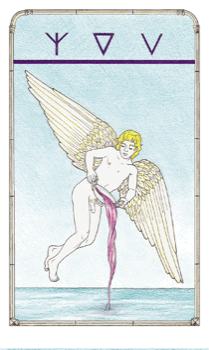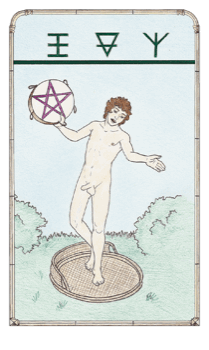 Send
comments about this page
Send
comments about this page Last update: 6 Sep 2022
The Eques is assistant to the Rex and Regina, and is nominally their offspring. In this role the Eques is action-oriented, and tends to be less bound by social responsibility than the Rex and less experienced than the Regina.
The Pages and Knights are immature and dominated by passive (i.e., spontaneous, reactive, undisciplined) qualities (Dry or Wet). For the Page it is willfulness (Dry), which combines with lack of discrimination (Cold) in the Earth element. In the Knight, obedience (Wet) has become dominant, which combines with discrimination (Hot) in the Air element. Thus Knights are the perfect executers of their parents' wishes, though they may err through blind obedience or excessive zeal.
The Knights are adolescents (in the characters of their Suits), as shown by the incorporation of the Wet quality, which is relational, for it permits them to conform to others and establish social bonds, including sexual relationships. This Wetness can also lead to the excessive conformity common in adolescence. (Contrast this with the Dry, egocentric quality of the prepubescent Pages). However, the Hot quality makes adolescent Knights increasingly discriminating in their relationships, though the basis of the discrimination may be the Wet qualities of conformity and the desire for approval.




However, the Knight of Wands lacks the Cold quality, which is the contractive principle and imparts stability, quietude, endurance and steadfastness. Therefore, the Knight of Wands tends to be flighty, unable to persevere, and always seeking novelty.
Image: Apollo as Lad of Fire. He wears a greenish-blue khiton (tunic) and holds a bow and arow; he is beardless, blond and stands against a sunny yellow background.
Commentary: Apollo is Lad of Fire because of his traditional association with the sun and because, as Lord of the Muses, he governs inspiration (suit of Wands). He is always depicted as a young man. See 5.High Priest and 18.Sun for more on Apollo; see also 6.Love.
Since the Knight of Swords lacks both the Dry and Cold qualities, which impart solidity (Dry) and stability (Cold), they may lack grounding and perseverance, and so exhibit poor judgement or erratic behavior.
Image: Athena as Maid of Air. She wears armor over a greenish-blue peplos (robe), holds an upright spear, and stands against a background of sky and clouds. An owl perches on her shoulder.
Commentary: Athena is Maid of Swords because she is a virgin battle goddess and because she is a goddess of wisdom (suit of Swords). She is also a Bird Goddess (cf. her owl), and so associated with the element Air (Dexter 119). See 20.Justice (Principal of the Sword) for more on Athena.
The Wet is also a quality of the inferior element (Water), where it combines with the Cold, which is mixing (thus Water is the element of relationship par excellence). Therefore these Knights tend to be social, and with the admixture of the Hot they tend to be romantic, idealistic, and imaginative. However the Knight of Cups lacks the Dry quality, which is the principle of solidity and form, so they may avoid commitment, and may be unprincipled in their relationships.
Image: Artemis as Maid of Water. She wears a greenish-blue khiton (tunic) and holds a bow and arrow; she stands against a deep-blue nighttime sky, in which the full moon shines.
Commentary: Artemis is Maid of Water because she is a Virgin Goddess and because of her association with the Moon. See 4.High Priestess and 17.Moon (Second of the Cup) for more on Artemis; see also 6.Love (Master of the Cup).
In the secondary qualities the Knight may vary between goal directedness and diligence (Hot) on one hand, and laziness and carelessness (Cold) on the other. An excess of the Hot may result in a the Knight who single-mindedly pursues a course when it should have been abandoned.
Image: Persephone as Maid of Earth. She wears a greenish-blue peplos (robe), holds a scepter, and sits in her throne on a background of green and brown earth tones.
Commentary: Although Persephone becomes the the bride of Hades and the Queen of the Underworld, she remains young, ever renewed in the spring. Thus she is always depicted as a young woman, the archetypal Kore (Maiden). She is the spirit of the seeds, which descends into the earth in winter and is reborn in spring, hence the browns and greens in her image. Persephone is associated with 4.High Priestess (Mistress of the Pentacle).
 Send
comments about this page
Send
comments about this page
Last update:
6 Sep 2022